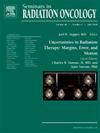辩论2:原发性局限性前列腺癌:全腺体近距离放射治疗的案例
IF 3.2
3区 医学
Q3 ONCOLOGY
引用次数: 0
摘要
全腺体近距离放射治疗(BT)联合外束放射治疗(EBRT)可提高中高危前列腺癌(PCa)的生化无复发生存率(bRFS)。三项随机对照研究(RCT)证明了EBRT优于单独使用EBRT,一项荟萃分析以及更新的长期数据表明,全腺体BT增强的持续益处。人们担心,肿瘤控制的改善是以牺牲晚期泌尿生殖系统(GU)和胃肠道(GI)毒性为代价的。尽管研究局灶性增强对前列腺内主要病变(DIL)的作用的研究已经取得了令人鼓舞的结果和低毒性率,但PCa的多灶性和多克隆性以及缺乏头对头随机对照试验使得很难证明使用局灶性增强代替整个腺体增强是合理的。同样,许多研究使用了各种EBRT技术来提供增强治疗,尽管放射生物学优势和更强的证据基础支持BT。在此基础上,以及精确描绘DIL的挑战,全腺体BT增强联合EBRT仍然是局部晚期PCa的最佳根治性放疗方案。本文章由计算机程序翻译,如有差异,请以英文原文为准。
Debate 2: Primary Localized Prostate Cancer: The Case for Whole-Gland Brachytherapy Boost
Whole gland brachytherapy (BT) boost in combination with external beam radiotherapy (EBRT) improves biochemical relapse free survival (bRFS) for intermediate- and high-risk prostate cancer (PCa). Three randomized control studies (RCT) have demonstrated superiority over EBRT alone, and a meta-analysis alongside updated long-term data demonstrates an ongoing benefit with whole gland BT boost. There are concerns that improved tumor control comes at the expense of late genitourinary (GU) and gastrointestinal (GI) toxicities. Although studies investigating the role of a focal boost to the dominant intraprostatic lesion (DIL) have been conducted with promising outcomes and low toxicity rates, the multifocal and multiclonal nature of PCa as well as lack of head-to-head RCTs makes it difficult to justify the use of focal boost in place of whole gland boost. Similarly, many studies have used various EBRT techniques to deliver boost treatment despite the radiobiological advantages and stronger evidence base advocating for BT. On this basis, as well as the challenges of precise delineation of the DIL, whole gland BT boost in combination with EBRT remains the optimal radical radiotherapy regime for locally advanced PCa.
求助全文
通过发布文献求助,成功后即可免费获取论文全文。
去求助
来源期刊
CiteScore
5.80
自引率
0.00%
发文量
48
审稿时长
>12 weeks
期刊介绍:
Each issue of Seminars in Radiation Oncology is compiled by a guest editor to address a specific topic in the specialty, presenting definitive information on areas of rapid change and development. A significant number of articles report new scientific information. Topics covered include tumor biology, diagnosis, medical and surgical management of the patient, and new technologies.

 求助内容:
求助内容: 应助结果提醒方式:
应助结果提醒方式:


